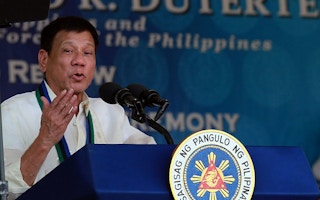Negotiations over a $36 million loan on climate change studies in the Philippines, one of the countries most at risk from the impacts of global warming, have bogged down as President Rodrigo Duterte lashes out against international scrutiny of his human rights record.
The loan was committed by Germany, one of 18 countries on the United Nations Human Rights Council (UNHRC) that voted on July 11 to set up an investigation into killings linked to Duterte’s massive and long-running drug war that has claimed more than 6,600 lives.
Duterte slammed the resolution, saying on July 12 that “they don’t understand the social, economic, political problems of the Philippines.” He later welcomed the probe and ensured that visiting representatives would get to see the effects of narcotics on local communities.
On Sept. 20, the Philippine Daily Inquirer reported on a “confidential memorandum” signed by Executive Secretary Salvador Medialdea and ordering cabinet and agency heads to terminate foreign loans and aid from the countries that backed the resolution.
Dated Aug. 27, 2019, the resolution reads: “In light of the administration’s strong rejection of the Resolution of the United Nations Human Rights Council, which carried through by the votes of a minority of the Council members of 11 July 2019 and calls upon the Philippines to take certain actions in relation to alleged human rights violations in the country, all concerned officials are DIRECTED to suspend negotiations for and signing of all loan and grant agreements with the government of the countries that co-sponsored and/or voted in favor of the aforesaid resolution, pending the assessment of our relations with these countries.”
Duterte’s office initially denied the memorandum, but on Sept. 23 the president said he remembered giving the go-ahead. The Department of Finance later said that two funding initiatives had been affected: a $22.9 million loan from France for the Metro Manila Bus Rapid Transit, and the $36 million loan from Germany for climate change studies.
The suspension of the German loan comes at a critical time for the Philippines, deemed highly vulnerable to the impacts of climate change, including rising sea levels and stronger and more frequent tropical storms.
While the Philippines’ Climate Change Commission (CCC) has yet to verify the nature and coverage of the studies that would have been funded, there’s a lack of extensive scientific research done locally on the hazards and cascading impacts of extreme weather events and changes in the world’s oceans, says Lourdes Tibig, one of the lead authors of the recent oceans report from the Intergovernmental Panel on Climate Change (IPCC).
Studies on extreme changes in the trade wind system and “its impacts on global variability, biogeochemistry, ecosystems as well as society” are missing in journals, as well as studies that take into consideration climate change impacts and human development and construction, she said.
The Philippines ranks fourth in the most vulnerable countries to exceptional disasters, the think tank German Watch says in the Global Climate Index 2019. Rapid changes in the cryosphere also pose challenges to the country’s bodies of water, extending fish declines and massive coral bleaching.
“The overall finding [of the IPCC Oceans report] is that anthropogenic climate change is modifying multiple climate-related events or hazards in terms of occurrence, intensity and severity … and increases the likelihood of confound events and hazards that could cause extreme disturbance on human systems,” Tibig said. “How it [ocean warming] impacts on the regional scale and on the Philippines … that’s where we really need more research,” she added.
Germany provided grants worth $63.4 million to the Philippines in 2018, which won’t be affected by the recent directive, according to Secretary of Finance Carlos Dominguez III. They fund, among other things, the creation of a National Climate Change Action Plan and assistance for local government units in developing climate-adaptive strategies and accessing climate financing facilities, according to data from the National Economic and Development Authority.
The grants also covered the continuing post-Typhoon Haiyan reconstruction program, biodiversity conservation and resource management in conflict areas in Mindanao, forest and climate protection in Panay Island in the Visayas, and capacity building for the management of protected areas in the country.
This story was published with permission from Mongabay.com.










